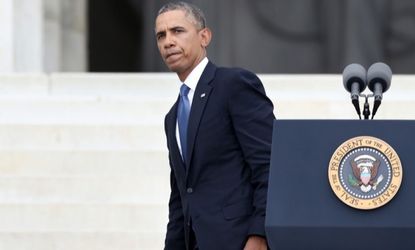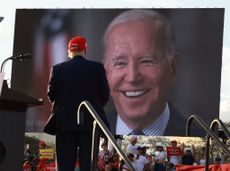Obama's shortsighted Syria strategy won't work
A long-delayed and limited strike won't oust Assad. Nor will it chasten America's enemies. So what's the point?


Washington is buzzing over President Obama's bombshell announcement that he'll seek congressional approval for an attack on Syria. But that wasn't the most surprising thing, or the biggest sign of weakness, to come out of the White House this past week. That would be the big, juicy bone tossed to Bashar al-Assad by this administration.
For the last two years, we've heard the president and his advisers say time after time that Assad had lost his legitimacy and it was time for him to go. Yet in the wake of Assad's most despicable act yet — the hellish gassing of more than 1,400 of his own citizens, an estimated 426 of them children — what did the administration do? It said Assad must be punished, must be taught a lesson — but that regime change was not a goal of any limited, narrow action that America would undertake.
In other words, a mass murderer gets a mere slap on the wrist. Boy, that'll teach Assad to mind his manners.
Subscribe to The Week
Escape your echo chamber. Get the facts behind the news, plus analysis from multiple perspectives.

Sign up for The Week's Free Newsletters
From our morning news briefing to a weekly Good News Newsletter, get the best of The Week delivered directly to your inbox.
From our morning news briefing to a weekly Good News Newsletter, get the best of The Week delivered directly to your inbox.
You can almost hear the snickering of Assad and his henchmen. A ruthless grip on power is their one and only priority — it's certainly not the well-being of their own citizenry — and the White House has just signaled that whatever may be coming their way, they'll probably be able to hunker down and ride it out.
Worse, this half-hearted American strategy sends a signal to Syria's benefactors in Iran and Russia, not to mention North Korea, that the United States can't be taken seriously on the world stage. It encourages exactly the opposite of what the president wishes to prevent, namely more provocative behavior from rogue states. In Tehran's case, it means lesser odds of a showdown over its ongoing nuclear weapons program. As for North Korea, which successfully tested nuclear weapons during the Bush era, the interpretation is likely one of U.S. weakness.
It's this sort of strategic incoherence that is fueling the considerable skepticism in Congress about any U.S. military action in Syria. The administration tried to address this last week with a 90-minute briefing for House and Senate leaders, but sources privy to the discussion say it raised more questions than it answered: What's the overall American mission? If we're not going to take Assad down, what will we do to him? How do we define a successful outcome, and how much will it cost? What happens if things don't go according to plan? Do we escalate? And what are the anticipated Iranian and Russian reactions and how will we deal with them?
It's not just Congress that needs convincing. Half of Americans oppose a U.S. attack on Syria. The president has yet to take his case directly to the American people. He must do so.
Sign up for Today's Best Articles in your inbox
A free daily email with the biggest news stories of the day – and the best features from TheWeek.com
All that said, not all criticism of Obama on Syria is warranted. There have been questions, for instance, about why the death of 1,400 people in a chemical weapons attack are enough to justify action, but not that of the 100,000 people who perished prior to the August 21 atrocity.
That's a fair question, and the answer, sadly, is that America cannot be the world's policeman and shouldn't be wading into the civil wars of others, tragic though they may be, unless there is a perceived threat to our own security or strategic interests.
Obama understands — correctly, in my view — that chemical weapons pose such a threat. In addition to sarin — the colorless, odorless gas believed to have been used in the August 21 massacre — Syria's chemical weapons arsenal is said to include mustard gas and tabun. Some analysts think it has also tried to weaponize VX, which is particularly deadly. The CIA estimates that Syria, which has refused to sign international chemical weapons treaties, has several hundred liters of these murderous gases.
But short of marching into Syria and physically seizing these weapons, which won't happen, Obama has no strategy to contain this threat. A "shot across the bow" with the naïve hope of somehow deterring a murderous tyrant who has nothing to lose won't work. What will Obama do then? There are only two players who have leverage on Assad: Vladimir Putin and Ali Khamenei, the Supreme Leader of Iran. Obama isn't on speaking terms with the former and has never spoken with the latter.
The president has boxed himself into a corner. Congress is skeptical. The American people are generally opposed. Even the British won't get involved. Just France and Turkey — hardly a robust alliance — are on board for military action. America's credibility, already badly damaged in the past decade, may have taken yet another hit. And Obama may well have emboldened our enemies.
Create an account with the same email registered to your subscription to unlock access.
An award-winning member of the White House press corps, Paul Brandus founded WestWingReports.com (@WestWingReport) and provides reports for media outlets around the United States and overseas. His career spans network television, Wall Street, and several years as a foreign correspondent based in Moscow, where he covered the collapse of the Soviet Union for NBC Radio and the award-winning business and economics program Marketplace. He has traveled to 53 countries on five continents and has reported from, among other places, Iraq, Chechnya, China, and Guantanamo Bay, Cuba.
-
 Cicada-geddon: the fungus that controls insects like 'zombies'
Cicada-geddon: the fungus that controls insects like 'zombies'Under The Radar Expert says bugs will develop 'hypersexualisation' despite their genitals falling off
By Chas Newkey-Burden, The Week UK Published
-
 'Voters know Biden and Trump all too well'
'Voters know Biden and Trump all too well'Instant Opinion Opinion, comment and editorials of the day
By Harold Maass, The Week US Published
-
 Is the Gaza war tearing US university campuses apart?
Is the Gaza war tearing US university campuses apart?Today's Big Question Protests at Columbia University, other institutions, pit free speech against student safety
By Joel Mathis, The Week US Published
-
 Arizona court reinstates 1864 abortion ban
Arizona court reinstates 1864 abortion banSpeed Read The law makes all abortions illegal in the state except to save the mother's life
By Rafi Schwartz, The Week US Published
-
 Trump, billions richer, is selling Bibles
Trump, billions richer, is selling BiblesSpeed Read The former president is hawking a $60 "God Bless the USA Bible"
By Peter Weber, The Week US Published
-
 The debate about Biden's age and mental fitness
The debate about Biden's age and mental fitnessIn Depth Some critics argue Biden is too old to run again. Does the argument have merit?
By Grayson Quay Published
-
 How would a second Trump presidency affect Britain?
How would a second Trump presidency affect Britain?Today's Big Question Re-election of Republican frontrunner could threaten UK security, warns former head of secret service
By Harriet Marsden, The Week UK Published
-
 'Rwanda plan is less a deterrent and more a bluff'
'Rwanda plan is less a deterrent and more a bluff'Instant Opinion Opinion, comment and editorials of the day
By The Week UK Published
-
 Henry Kissinger dies aged 100: a complicated legacy?
Henry Kissinger dies aged 100: a complicated legacy?Talking Point Top US diplomat and Nobel Peace Prize winner remembered as both foreign policy genius and war criminal
By Harriet Marsden, The Week UK Last updated
-
 Trump’s rhetoric: a shift to 'straight-up Nazi talk'
Trump’s rhetoric: a shift to 'straight-up Nazi talk'Why everyone's talking about Would-be president's sinister language is backed by an incendiary policy agenda, say commentators
By The Week UK Published
-
 More covfefe: is the world ready for a second Donald Trump presidency?
More covfefe: is the world ready for a second Donald Trump presidency?Today's Big Question Republican's re-election would be a 'nightmare' scenario for Europe, Ukraine and the West
By Sorcha Bradley, The Week UK Published